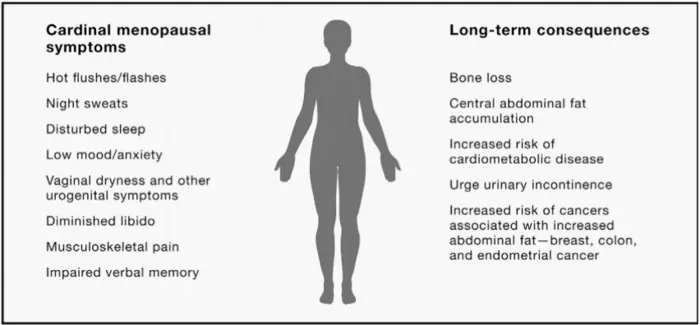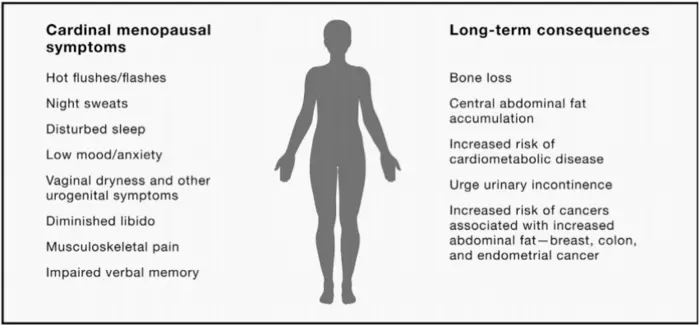Although about half of people go through menopause, less than 15% of them receive effective treatment for their symptoms. Treatment options for people experiencing irritating or severe menopause symptoms are often under researched, and some have questionable efficacy, or cause harmful side effects. In a comprehensive review publishing in the journal Cell on September 6, a team of world-renowned menopause experts summarizes what we know about menopause, calls for more research into the timeline and treatment of menopause, and encourages individualized, holistic treatment that addresses both menopausal symptoms and other systemic changes happening in the body.

Credit: Cell, Davis et al.
Although about half of people go through menopause, less than 15% of them receive effective treatment for their symptoms. Treatment options for people experiencing irritating or severe menopause symptoms are often under researched, and some have questionable efficacy, or cause harmful side effects. In a comprehensive review publishing in the journal Cell on September 6, a team of world-renowned menopause experts summarizes what we know about menopause, calls for more research into the timeline and treatment of menopause, and encourages individualized, holistic treatment that addresses both menopausal symptoms and other systemic changes happening in the body.
“The road to menopause is not difficult for all, but for some, symptoms may be severe or even disabling and disruptive to work and family,” write the authors, who are based in Australia, Italy, and the United States. “Recognition that menopause, for most women, is a natural biological event, does not exempt the use of interventions to alleviate symptoms.”
For this review, the researchers looked at over 200 sources across 71 years to synthesize what’s currently known about menopause. The authors note the importance of recognizing that menopause impacts more than just cis women; they elect to use the term “women” in this review to reflect the language and focus of much of the research that currently exists in the field.
Key takeaways from the review include the following:
- The authors propose a new definition for menopause as “final cessation of ovarian function,” an update to the traditional definition, which focused on menstruation. While the new definition doesn’t account for all variability, it seeks to encompass people of all genders, as well as people who have irregular periods, use certain types of contraception like IUDs, have had hysterectomies, and more.
- The timeline of when menopause phases occur isn’t well understood and varies from person to person, so the authors argue that current age restrictions on prescriptions and therapies are illogical and problematic. While symptoms often start during perimenopause, few menopause therapies are currently approved for perimenopausal patients.
- Menopause treatments range from hormone therapies to lasers to plant products, but the authors argue that few have been studied over long enough timespans. They highlight potential side effects and health concerns for each type of treatment and note that even the most effective and well-researched option available presently—hormone therapy targeting estrogen—is still far from a perfect solution for all.
- Symptoms vary widely between people and throughout the course of menopause. Some people get many severe symptoms while others get few to none; but even if someone has no noticeable symptoms, there can still be significant “silent health consequences,” including bone loss and a higher risk of diabetes, cardiovascular diseases, and certain types of cancers. Additionally, the authors highlight that some symptoms, like short-term memory loss, can be temporary, and note that other symptoms, like depression and anxiety, are sometimes pre-existing conditions that have been falsely attributed to menopause due to stigma surrounding it. They also recommend exercising regularly and maintaining a nutritious diet that includes plenty of protein as a way to reduce the likelihood of contracting symptomatic health complications.
- The authors highlight the fact that socio-economic factors such as lower quality of life and the potential negative impact of menopausal symptoms on a woman’s work performance aren’t often acknowledged.
“Despite decades of research pertaining to menopause, more work is needed,” write the researchers. Going forward, they call researchers to look deeper into when the menopause process starts and to focus on making menopause treatments more effective and safer overall. They underline the importance of researching the symptoms and other health impacts of menopause outside of high-income countries. Additionally, they suggest studying the impacts of menopause on work both from home and in an office, as well as the impacts on people with less traditional career paths such as caregivers and volunteers.
The team also argues that menopause treatments need to be holistic and tailored to the person being treated—addressing both the physical and mental health impacts of menopause, as well as the underlying health risks associated with menopause and any other relevant health concerns. “Women with bothersome menopausal symptoms should be counseled on treatment options and offered evidence-based therapies,” they write. “Therapy should be individualized depending on age and health risks, recognizing that health risks may increase with age.”
“Optimizing health at menopause is the gateway to healthy aging for women,” write the authors.
###
Cell, Davis et al. “Menopause – Biology, Consequences, Supportive Care and Therapeutic Options.” https://www.cell.com/cell/fulltext/S0092-8674(23)00905-4 DOI: 10.1016/j.cell.2023.08.016
Cell (@CellCellPress), the flagship journal of Cell Press, is a bimonthly journal that publishes findings of unusual significance in any area of experimental biology, including but not limited to cell biology, molecular biology, neuroscience, immunology, virology and microbiology, cancer, human genetics, systems biology, signaling, and disease mechanisms and therapeutics. Visit: http://www.cell.com/cell. To receive Cell Press media alerts, contact [email protected].
Journal
Cell
DOI
10.1016/j.cell.2023.08.016
Method of Research
Literature review
Subject of Research
People
Article Title
Menopause – Biology, Consequences, Supportive Care and Therapeutic Options
Article Publication Date
6-Sep-2023





